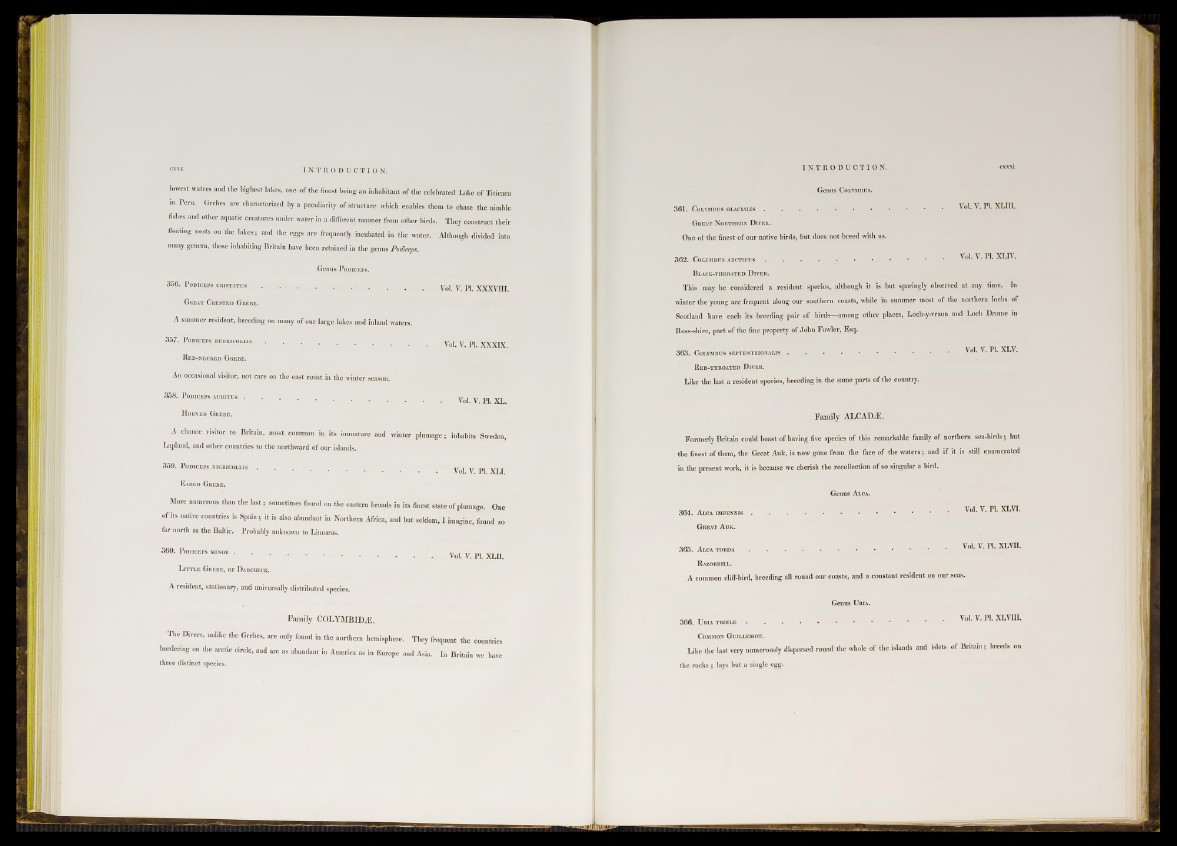
lowest waters and the highest lakes, one o f the finest being an inhabitant o f the celebrated Lake o f T iticaca
in Peru. Grebes arc characterized by a peculiarity o f structure which enables them to chase the nimble
fishes and other aquatic creatures under water in a different manner from other birds. They construct their
floating nests on the lak es; and the eggs are frequently incubated in the water. Although divided into
many genera, those inhabiting Britain have been retained in the genus Podiceps.
Genus P o d i c e p s .
356. P o d i c e p s c r i s t a t u s Vol V PI XXXVIII
G rea t C r e s t e d G r e b e .
A summer resident, breeding on many o f our large lakes and inland waters.
357. P o d i c e p s r u b r i c o l l i s ........................................................................................................... y 0 j y p j
R e d -n e c k ed G r e b e .
An occasional visitor, not rare on the east coast in the winter season.
358. P o d ic e p s a u b i t u s .................................................................................................................................Vol. V. PI. XL.
H o r n ed G r e b e .
A chance visitor to Britain, most common in its immature and winter plumage; inhabits Sweden,
Lapland, and other countries to the northward of our islands.
359. P o d i c e p s n i g b i c o l l i s vol. V. PI. X U .
E a red G r e b e .
More numerous than the l a s t ; sometimes found on the eastern broads in its finest state o f plumage. One
o f its native countries is Spain ; it is also abundant in Northern Africa, and but seldom, I imagine, found so
far north as the Baltic. Probably unkuown to Linnseus.
360. P o d i c e p s m i n o r ............................................................................................ Vol. V. PI. XLII.
L it t l e G b e b e , o r D a b ch ick .
A resident, stationary, and universally distributed species.
F am ily C O L Y M B IIM i.
The Divers, unlike the Grebes, are only found in the northern hemisphere. They frequent the countries
bordering on the arctic circle, and are as abundant in America as in Europe and Asia. In Britain we have
three distinct species.
Genus C o lym b u s .
361. C o ly m b u s g l a c i a l i s ...............................................................................................................................^ ^ XLIII.
G r ea t N o r th e r n D iv e r .
One of the finest o f our native birds, but does not breed with us.
362. C o ly m b u s a r c t i c u s . . . XLIV.
B lack-th r o a t e d D iv e r .
This may be considered a resident species, although it is but sparingly observed at auy time. In
winter the young are frequent along our southern coasts, while in summer most o f the northern lochs of
Scotland have each its breeding pair o f birds—among other places, Loch-y-vraon and Loch Drome in
Ross-shire, p a rt of the fine property of John Fowler, Esq.
363. C o ly m b u s s e p t e n t r i o n a l i s .................................................................................................................................XLV.
R e d -th r o a t e d D iv e r .
Like the last a resident species, breeding in the same parts o f the country.
F am ily A L C A D iE .
Formerly Britain could boast o f having five species o f this remarkable family o f northern sea-birds; but
the finest of them, the Great Auk, is now gone from the face o f the w aters; and if it is still enumerated
in the present work, it is because we cherish the recollection o f so singular a bird.
Genus A l c a .
364. A l c a i m p e b n i s .................................................................................................................................Vol. V. PI. XLVI.
G r ea t A u k .
365. A l c a t o b d a .................................................................................................................................Vol. V. PI. XLVII.
R a zo r b il l .
A common cliff-bird, breeding all round our coasts, and a constant resident on our seas.
Genus U r i a .
non XT 366. U r i a t r o i l e . . . . • • • • • • . • . . VOL V. PI. XLVIII.
C ommon G u il l em o t .
Like the last very numerously dispersed round the whole o f the islands and islets o f Britain; breeds on
the rocks ; lays but a single egg.